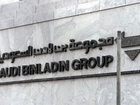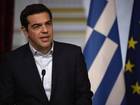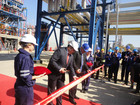Saudi Binladin Group, which has laid off tens of thousands of employees because of financial difficulties, said on Monday it has begun paying delayed wages to its remaining staff.
 Full Story
Full Story
Eurozone finance ministers on Monday tackled crucial talks on unlocking vital cash and debt relief for Greece just hours after Greek lawmakers adopted unpopular reforms demanded as part of the country's bailout.
The 19 ministers, meeting in Brussels, are aiming to finally sign off on the long-delayed first review of Greece's massive EU-IMF bailout -- the country's third in five years -- and begin talks on reducing Athens's mountain of debt.
 Full Story
Full Story
Romanian prosecutors said Monday they had seized a refinery held by Kazakhstan's KazMunaiGaz, which recently came under Chinese control, in a tax fraud probe.
The seizure of the Petromidia refinery in eastern Romania is part of an investigation into tax evasion, money laundering and fraud.
 Full Story
Full Story
Crude prices extended gains in Asia Monday as raging wildfires hit production in Canada, while traders digested news that Saudi Arabia had replaced its oil minister.
At about 0630 GMT, U.S. benchmark West Texas Intermediate for June delivery was up 78 cents, or 1.75 percent, at $45.44 a barrel while North Sea Brent for July was up 56 cents, or 1.23 percent, at $45.93.
 Full Story
Full Story
Syria's currency hit its lowest value since the start of the country's five-year conflict on Sunday, having depreciated more than 92 percent, an economist said.
 Full Story
Full Story
With a major government reshuffle, Saudi Arabia's King Salman and his powerful son have shown their determination to move the kingdom's economy away from oil, experts say.
 Full Story
Full Story
The new energy minister of Saudi Arabia, the world's biggest oil exporter, on Sunday pledged continuity in the kingdom's oil policy, after being named in a major government overhaul.
 Full Story
Full Story
China's exports slumped nearly two percent in April compared to the same month last year, as imports fell almost 11 percent, officials said Sunday, the latest sign of weakness in the world's second largest economy.
 Full Story
Full Story
Panama's reputation as a world-class financial hub is being torn apart from the double scandals of the Panama Papers and now the U.S. designating one of its most prominent families as top money launderers for drug cartels.
"This is like a magnitude-10 earthquake for Panama's economic system and society, but it shouldn't be a surprise," said Miguel Antonio Bernal, a professor in constitutional law at the University of Panama.
 Full Story
Full Story
U.S. energy giant Chevron has lost thousands of barrels worth of oil production capacity since militants blew up an offshore platform in Nigeria in renewed violence that could hit exports from Africa's largest oil producer, the company said.
"Approximately 35,000 barrels per day (bpd) of Chevron's net crude oil production in Nigeria are impacted," company spokeswoman Isabel Ordonez said in a statement late Friday.
 Full Story
Full Story



